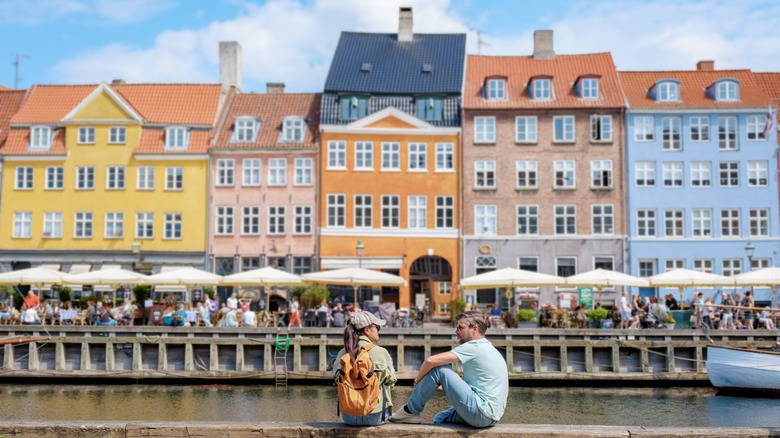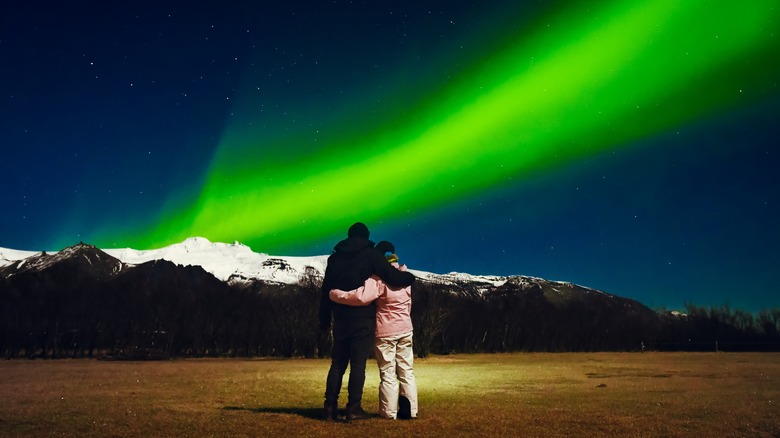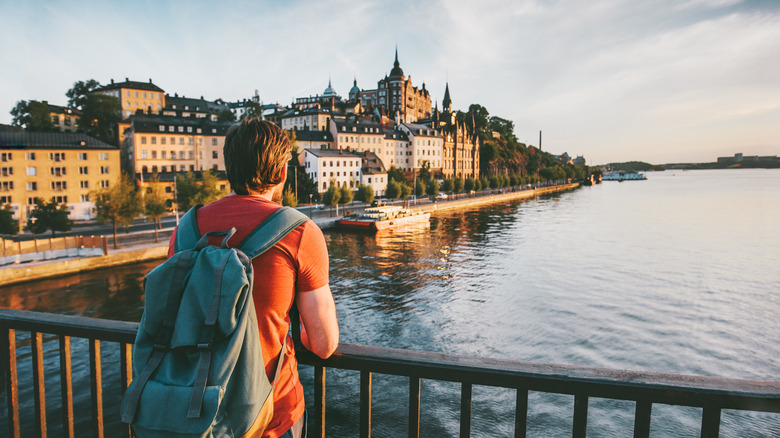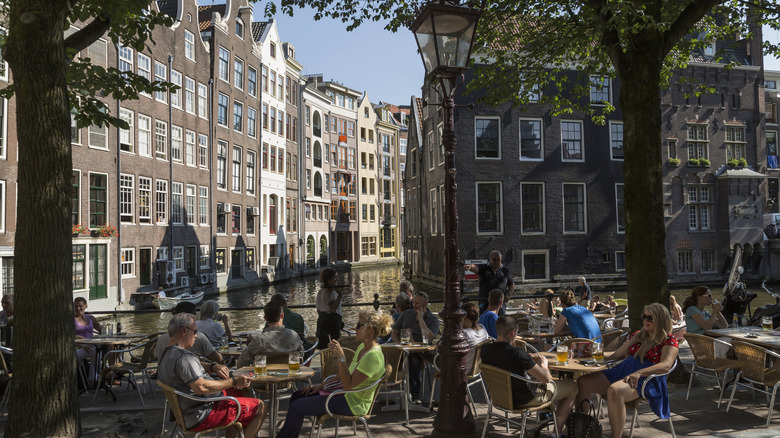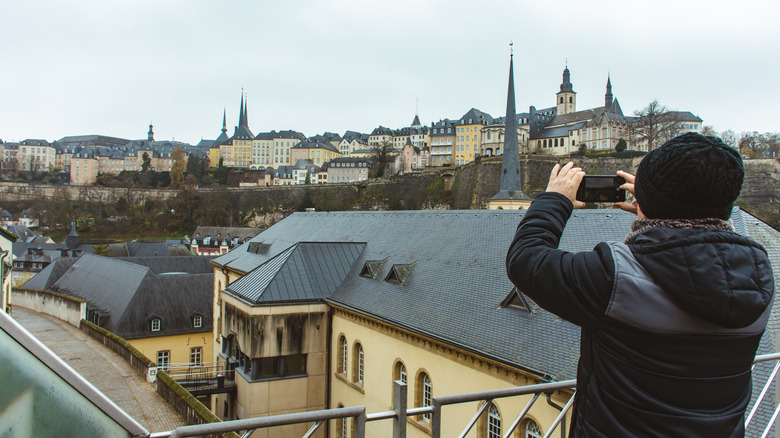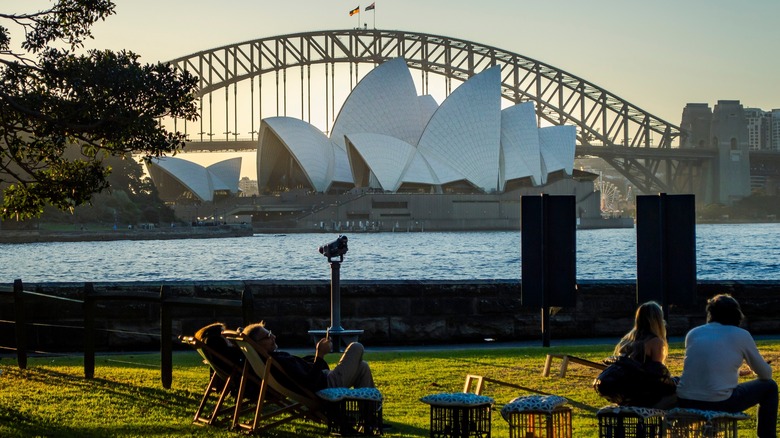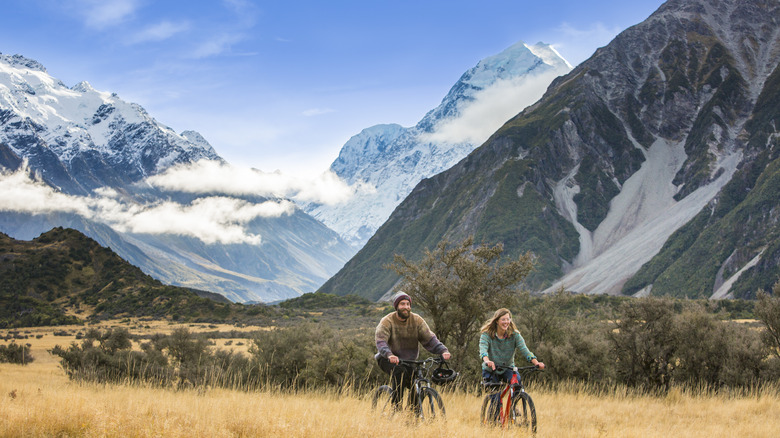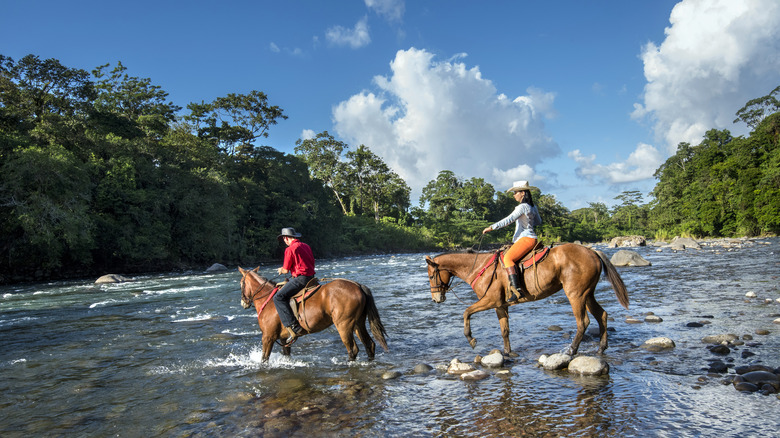The 14 Happiest Countries In The World
Happiness is a profound concept that can hardly be translated to numeric data. And yet, researchers and experts have set down certain objective parameters through which to quantify this elusive feeling people across the globe are chasing. Every year, some of the world's leading think tanks and international institutions — namely, Gallup, the United Nations, and, more recently, the University of Oxford — come together in a bid to understand human development and publish happiness rankings in the World Happiness Report.
The happiness criteria for which countries are analyzed cover a spectrum of six wide-ranging categories that are said to add up significantly toward human well-being: gross domestic product (GDP) per capita, social support, healthy life expectancy, freedom, generosity, and corruption. Since the initiation of this particular report in 2013, Scandinavian countries (Denmark, Norway, Sweden, Finland, and Iceland) have consistently commanded top rankings, with the whole world looking to them in an attempt to figure out what they have been doing right.
"It's important to state they're not talking about happiness in the way we do on a day-to-day basis," renowned psychologist Dr. Tim Sharp, alternatively known as Dr. Happy in Australia (which also features on the ranking), told ABC News. "What these surveys are really measuring is a much broader and bigger and higher construct, which is things like access to education, transport, healthcare and freedom, security and safety." Here are the happiest countries in the world and the factors that go into giving them this wonderful distinction.
Finland
For seven years straight, Finland has carried the aspirational title of happiest country in the world — a clear indication that the Nordic paradise is doing something right. Going by the World Happiness Report's parameters, Finland's score tallied up to 7.74 in 2024. Finnish people seem to enjoy an unparalleled sense of social and political security that contributes to their happiness. As behavioral scientist and researcher Elisabet Lahti told Business Finland on the subject, "To feel safe is one of our primal needs and if we're not safe, we're not able to relax into co-creation and innovation."
Finland's approach to a good life includes a deep appreciation of nature. They have also molded their country into the best in the world for retirees. Supporting and empowering Finnish happiness is the tenacious spirit of "sisu." Sisu is a way of life that encourages unconditional perseverance and hardiness in the face of the toughest situations and has been spurring Finns forward for generations. In the words of a Finnish woman who reflected on the happiness of her country's people in The New York Times: "We don't whine. We just do."
Denmark
Another country whose reputation for happiness precedes it is Denmark. Much like Finland, this Nordic nation does well on the social requisites that are understood to be indicators of satisfaction — such as equality, security, and trust in a welfare system that offers free education and healthcare. The Danes also enjoy a stable work-life balance that doubtless contributes to their overall well-being. And given that Denmark is known for being Europe's most child-friendly destination as well as a haven for senior citizens, one might safely conclude that even those without employment are leading fulfilling lives here.
In short, Denmark makes sure that everyone is taken care of, which assures a sense of shared happiness within the community. As Lars Larsen, a psychology professor at Aarhus University, explained to HuffPost: "It's more difficult to be happy if others are not and that's why we see some affluent nations not scoring as high as you might expect." Danish happiness is also famously contained in the untranslatable sentiment of hygge — a way of life that typically conjures up an aesthetic image of cozying up with a book and a hot chocolate by the fireplace but really just conveys the importance of slowing down in life to invest in moments that bring joy.
Iceland
Iceland has always been a high achiever in terms of happiness levels. But one particular edge this beautiful land of fire and ice has over not just its happy Scandinavian neighbors but the whole world is that it is also the safest country in the world. According to the Global Peace Index, Iceland has laid claim to this coveted crown for 15 consecutive years — a fact that surely ties in with its status as one of the happiest places in the world. Iceland's tiny population remains largely undisturbed by class tensions, crime, lack of welfare, and social inequality.
"Iceland is also a very peaceful nation — for example, we have never had an army. There is a high level of trust in the society, too," Dóra Gudmundsdóttir, director of public health at Iceland's Directorate of Health, told the Greater Good Magazine. Interestingly enough, this picturesque country also emerges at the top with a stellar score on pay parity and gender equality, ensuring all-round social security for women — yet another factor that plays into Iceland's happiness score, given the perceptible overlap between countries that value both their well-being and women highly.
Sweden
Hinged on the prudent philosophy of lagom — which advocates for a measured life made of not too much, not too little, but just enough — Sweden has managed to hold its place as one of the world's happiest countries for years. Like the other Nordic nations that surround it, Sweden has seemingly figured out just the right balance of ingredients that go into a happy life — whether it's a reasonable work-life arrangement or an egalitarian society where people feel safe. The latter is particularly instrumental in ensuring that a general sense of happiness persists among the masses.
As Dr. John Helliwell, economist and editor of the World Happiness Report, told Euro News, "[W]here [the Nordics] are really top on, is in trust and benevolence, both within their official institutions and their private behavior." Dr. Helliwell also reiterated to the publication that happiness abounded in places where the "happiness gap" — an estimation of the difference in happiness levels among people — is calculably low, which is true of a country like Sweden that offers its citizens a high quality of life, several welfare benefits, and an unbroken legacy of political stability.
Israel
The war-torn region of Israel might seem like an unlikely contender on a list of the world's happiest countries. But the Holy Land, which came in fifth on the latest World Happiness Report, has been making an appearance in the United Nations rankings since the list's inception in 2013. One consensus is that, notwithstanding its political troubles, Israel continues to prize values of community and social support highly. The report also categorically highlights the country's "emotional resilience" during the Hamas-led offensive on October 7, 2023, which is understood to have started the latest explosion of tensions between Israel and Palestine.
While Israel's emotional evaluation scores don't present the happiest picture, the country has done exceptionally well in terms of satisfaction among younger age groups. According to some analysts, the happiness review has to be looked at through a wider lens. "This means factors such as the economy, the degree of social involvement, and the health services in the country affect the ranking more than fleeting feelings," Anat Fanti, a happiness researcher at Bar-Ilan University, told The Jerusalem Post, explaining that these metrics were informed over a period of time instead of just one year.
Netherlands
Backed by high standards of living, belief in a healthy personal-professional balance, and a robust social security system, the Netherlands maintains a high index of happiness. Life in this European country is charged greatly by ideas of freedom, and people can characteristically live as they please without judgment. This shows not just through the easygoing approach to life in the Netherlands, but also tangibly — in the country's support for LGBTQ+ rights, for instance, or the infamous Dutch aversion to getting too personal with strangers, or the fact that the Netherlands comes out at the top as a place with the happiest children in the world.
Happiness is woven deep into the fabric of the Netherlands, where the culture of productivity-driven economic prosperity is adequately evened out by the communal ethos of niksen. Basically, the art of doing nothing. In the words of stress expert Carolien Hamming, the concept "literally means to do nothing, to be idle or doing something without any use" and can manifest in an activity as simple as staring out at the window — "as long as it's without purpose" (via Time).
Norway
Norway was once the happiest country in the world, ranking first on the 2017 World Happiness Report. And while it has dropped down to seventh place according to latest research, it hardly undercuts Norway's status as a blissful place to live. Backed by highly developed foundations and functionalities, Norway offers a safe and peaceful existence to its people, who are hemmed in rather securely by the country's political, economic, and social systems. Needless to say, the future-forward course Norway is taking accommodates ample space for women in the country to flourish, vis-à-vis key factors like education, jobs, and health.
Like the other countries in its Scandinavian neighborhood, Norway has its own unique philosophy with which to approach happiness — koselig. It's a quintessentially Norwegian concept that calls upon warmth-inducing feelings of contentment and coziness that counteract the region's cold, wintry climate. Norwegians seem to know the value of engaging in activities that relieve stress, such as being out and about in nature or spending time indoors with their loved ones. "There is a view which suggests that historically communities that lived in harsher weather were brought together by greater mutual support," World Happiness Report editor Dr. John Helliwell told Time magazine, offering an explanation for Nordic happiness.
Luxembourg
Luxembourg is more than just an underrated travel destination. It shines through as one of the happiest countries in the world — and as one of the wealthiest on the basis of GDP per capita. Naturally, the quality of life in this tiny European nation surpasses that of many others. Besides economic stability, Luxembourg does well on other happiness-measuring metrics as well, including political trust, social security, and highly functional health and safety systems. People's welfare is clearly a priority in Luxembourg, which in 2020 became the first country ever to make public transportation free for all.
While Luxembourg's lucrative job market is among its most highlighted features in the context of progress, the country is also very wealthy in terms of natural abundance, which it nurtures with persistent eco-conscious reforms and sustainability initiatives. Not to mention, Luxembourg has also been able to foster a very inclusive culture, assimilating people from around the world. As the BBC quoted a native Luxembourgish teacher as saying about the namesake capital city: "It doesn't matter who you are or what you look like, you're always welcome."
Switzerland
To travelers around the world, the appeal of Switzerland might primarily be defined by its stunning mountain scapes, luxury watches, and legendary cheeses and chocolates. But another Swiss trademark that the locals are probably more acquainted with than tourists is an ubiquitous sense of happiness and contentment. Switzerland has consistently found a place on every edition of the United Nations' World Happiness Report since 2013 — usually hovering near the top of the ranking — and if not, then always in at least the top 10.
The ninth position it claimed in the latest report can be tacked down to the high quality of life Switzerland offers its inhabitants — which can alternatively appear expensive to an outsider. Boasting one of the strongest healthcare systems in the world and a fertile business landscape, the country evidently prioritizes important metrics of well-being and success that can translate into economic strength. According to one opinion expounded in Inc.: "My Swiss husband assures me that a Swiss person's happiness is directly correlated with the amount in the bank. While the rest may be important, it's always secondary."
Australia
Australia made it to the United Nations-backed global ranking of the happiest countries in the world yet again, coming in at 10th place this time. Life is unsurprisingly good in the Land Down Under — where the surf's always up, sunny days aren't hard to come by, and despite the dangerous Aussie wildlife that coexists alongside human habitation, people live with a peaceful sense of security. With one of the world's highest average life expectancies and a standard of living few countries can match, Australia ensures an evident stability for its people on key fronts, including politics.
The World Happiness Report, however, makes a striking observation about the chasm in happiness between Australia's senior populations and its youth, with the latter labeled "the least happy age group." While much that demands attention has been researched and written about the drop in life satisfaction among Australians amid soaring market prices all over, the lucky country still emerges near the top vis-à-vis several objective variables of happiness that are associated with economic development, essentials like education, and civil freedoms.
New Zealand
New Zealand, like neighboring Australia, has been a longtime high achiever in terms of happiness metrics. It is not hard to see why given the balanced makeup of the Kiwi country's fundamental systems — from its well-endowed natural landscapes to its well-maintained sociopolitical foundations. While New Zealand shares many of the issues faced by Australian populations — with low levels of satisfaction among younger Kiwis and higher costs of living building up economic pressure — it performs better than Oz on certain fronts.
As expert Auckland economist Shamubeel Eaqub detailed to ABC News, even in the event of a lower GDP in New Zealand, "welfare provisions are more generous and there is perceived lower corruption." New Zealand is also famously ranked as one of the world's safest countries — coming in at fourth place on the 2024 Global Peace Index report — allowing enough leg room for personal expressions, identities, and freedoms to thrive, while remaining a peaceful, low-conflict participant on the global stage.
Costa Rica
There's no doubt that Costa Rica promises an unforgettable vacation to world travelers. But even to locals, it's a place where the good times never stop rolling. Blessed with tropical weather, a vibrant culture of art and music, lush green coverage, stable government institutions, and an overarching spirit of pura vida — or pure life — it's hardly a surprise that this Central American paradise has been a steady fixture on the World Happiness Report since the very beginning. Interestingly, Costa Rica's status as one of the happiest countries in the world does not come tagged with a reputation for having a powerful economy — as is the case with many of its fellow contenders on this list.
Deemed a "development success story" by the World Bank, Costa Rica has sure shown significant economic growth over the years, allocating money to sectors of development rather mindfully — think education, reforestation, and senior healthcare. As happiness expert and economics professor Mariano Rojas told HuffPost, "Costa Rica tells us that there is something beyond money that is important. ... There is a way to spend money that contributes to the happiness of the people."
Kuwait
Kuwait has witnessed a major uptick in happiness levels over the years, going by the World Happiness Report's assessments. In the publication's 2024 rankings, the Arab country came in at the 13th position, a significant upgrade from its 32nd position on the report's inaugural edition in 2013. As the report highlighted, Kuwait is a first-time inductee into the prestigious top 20 list of happiest countries and, according to statistics, has been able to ensure a somewhat uniform level of satisfaction among people across young and old age groups.
While the perception that Kuwait is not the most progressive country in terms of civil liberties weighs down on its sociopolitical image on the world stage, its predominance as a tax-free haven rich in oil and gas reserves renders it a powerful international player. Domestically, Kuwaitis benefit greatly from the emirate's generous social welfare system, which gives coverage to a varied demographic — from people with disability to economically weaker groups — across life-elevating aspects of education, housing, and healthcare.
Austria
Happiness in Austria is so singular that by some accounts, it can't be measured by official indices. While the World Happiness Report ranked this mountain paradise 14th in 2024, multiple other analytics platforms have deemed it the happiest place in the world, where satisfaction and joy run high. People in Austria enjoy a high quality of life that covers a broad range of factors contributing to the country's high score on the happiness meter. One evident marker is Austria's status as one of the richest countries in Europe, with an economy that commands respect in the global market.
Austrians display a strong sense of security when it comes to the more social aspects of their lives too, committing significant time to their family, friends, and other interpersonal dynamics. There is also surely something to be said about the scenic beauty that abounds in Austria. It is home to fairy-tale locales like Hallstatt, which — with its postcard-perfect landscapes — is among the most visited places on Earth. The stunning alpine topography of this country offers endless opportunities for hiking, skiing, or simply being outdoors to connect with nature.


